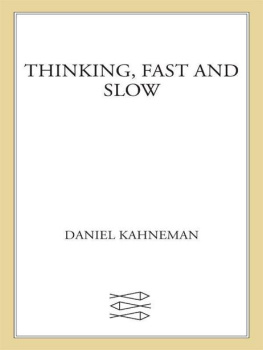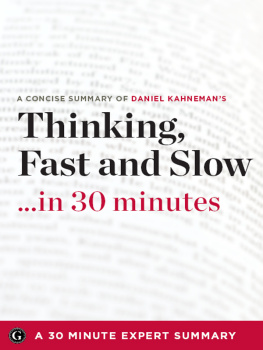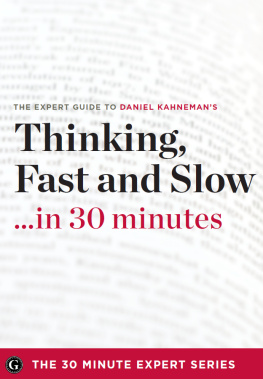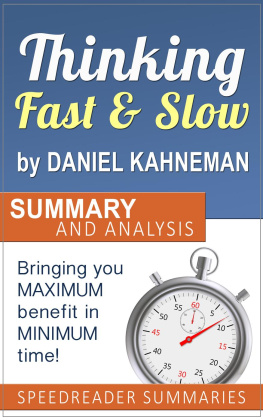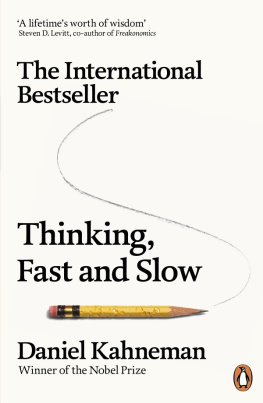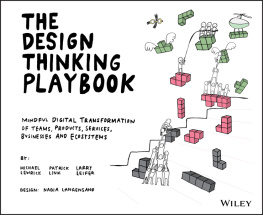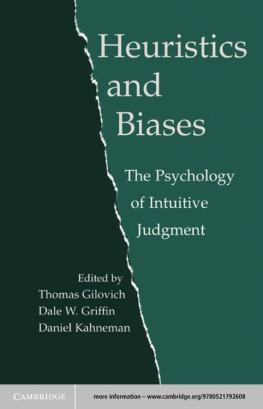Kahneman - Thinking, Fast and Slow
Here you can read online Kahneman - Thinking, Fast and Slow full text of the book (entire story) in english for free. Download pdf and epub, get meaning, cover and reviews about this ebook. City: New York, year: 2011, publisher: Farrar, Straus and Giroux, genre: Religion. Description of the work, (preface) as well as reviews are available. Best literature library LitArk.com created for fans of good reading and offers a wide selection of genres:
Romance novel
Science fiction
Adventure
Detective
Science
History
Home and family
Prose
Art
Politics
Computer
Non-fiction
Religion
Business
Children
Humor
Choose a favorite category and find really read worthwhile books. Enjoy immersion in the world of imagination, feel the emotions of the characters or learn something new for yourself, make an fascinating discovery.
Thinking, Fast and Slow: summary, description and annotation
We offer to read an annotation, description, summary or preface (depends on what the author of the book "Thinking, Fast and Slow" wrote himself). If you haven't found the necessary information about the book — write in the comments, we will try to find it.
Abstract: Kahneman exposes the extraordinary capabilities and also the faults and biases of fast thinking, and the pervasive influence of intuitive impressions on peoples thoughts and choices
Thinking, Fast and Slow — read online for free the complete book (whole text) full work
Below is the text of the book, divided by pages. System saving the place of the last page read, allows you to conveniently read the book "Thinking, Fast and Slow" online for free, without having to search again every time where you left off. Put a bookmark, and you can go to the page where you finished reading at any time.
Font size:
Interval:
Bookmark:

In memory of Amos Tversky
Contents
Part I. Two Systems
Part II. Heuristics and Biases
<5>
Part III. Overconfidence
Part IV. Choices
Part V. Two Selves
Introduction
Every author, I suppose, has in mind a setting in which readers of his or her work could benefit from having read it. Mine is the proverbial office watercooler, where opinions are shared and gossip is exchanged. I hope to enrich the vocabulary that people use when they talk about the judgments and choices of others, the companys new policies, or a colleagues investment decisions. Why be concerned with gossip? Because it is much easier, as well as far more enjoyable, to identify and label the mistakes of others than to recognize our own. Questioning what we believe and want is difficult at the best of times, and especially difficult when we most need to do it, but we can benefit from the informed opinions of others. Many of us spontaneously anticipate how friends and colleagues will evaluate our choices; the quality and content of these anticipated judgments therefore matters. The expectation of intelligent gossip is a powerful motive for serious self-criticism, more powerful than New Year resolutions to improve ones decision making at work and at home.
To be a good diagnostician, a physician needs to acquire a large set of labels for diseases, each of which binds an idea of the illness and its symptoms, possible antecedents and causes, possible developments and consequences, and possible interventions to cure or mitigate the illness. Learning medicine consists in part of learning the language of medicine. A deeper understanding of judgments and choices also requires a richer vocabulary than is available in everyday language. The hope for informed gossip is that there are distinctive patterns in the errors people make. Systematic errors are known as biases, and they recur predictably in particular circumstances. When the handsome and confident speaker bounds onto the stage, for example, you can anticipate that the audience will judge his comments more favorably than he deserves. The availability of a diagnostic label for this biasthe halo effectmakes it easier to anticipate, recognize, and understand.
When you are asked what you are thinking about, you can normally answer. You believe you know what goes on in your mind, which often consists of one conscious thought leading in an orderly way to another. But that is not the only way the mind works, nor indeed is that the typical way. Most impressions and thoughts arise in your conscious experience without your knowing how they got there. You cannot tracryd>e how you came to the belief that there is a lamp on the desk in front of you, or how you detected a hint of irritation in your spouses voice on the telephone, or how you managed to avoid a threat on the road before you became consciously aware of it. The mental work that produces impressions, intuitions, and many decisions goes on in silence in our mind.
Much of the discussion in this book is about biases of intuition. However, the focus on error does not denigrate human intelligence, any more than the attention to diseases in medical texts denies good health. Most of us are healthy most of the time, and most of our judgments and actions are appropriate most of the time. As we navigate our lives, we normally allow ourselves to be guided by impressions and feelings, and the confidence we have in our intuitive beliefs and preferences is usually justified. But not always. We are often confident even when we are wrong, and an objective observer is more likely to detect our errors than we are.
So this is my aim for watercooler conversations: improve the ability to identify and understand errors of judgment and choice, in others and eventually in ourselves, by providing a richer and more precise language to discuss them. In at least some cases, an accurate diagnosis may suggest an intervention to limit the damage that bad judgments and choices often cause.
Origins
This book presents my current understanding of judgment and decision making, which has been shaped by psychological discoveries of recent decades. However, I trace the central ideas to the lucky day in 1969 when I asked a colleague to speak as a guest to a seminar I was teaching in the Department of Psychology at the Hebrew University of Jerusalem. Amos Tversky was considered a rising star in the field of decision researchindeed, in anything he didso I knew we would have an interesting time. Many people who knew Amos thought he was the most intelligent person they had ever met. He was brilliant, voluble, and charismatic. He was also blessed with a perfect memory for jokes and an exceptional ability to use them to make a point. There was never a dull moment when Amos was around. He was then thirty-two; I was thirty-five.
Amos told the class about an ongoing program of research at the University of Michigan that sought to answer this question: Are people good intuitive statisticians? We already knew that people are good intuitive grammarians: at age four a child effortlessly conforms to the rules of grammar as she speaks, although she has no idea that such rules exist. Do people have a similar intuitive feel for the basic principles of statistics? Amos reported that the answer was a qualified yes. We had a lively debate in the seminar and ultimately concluded that a qualified no was a better answer.
Amos and I enjoyed the exchange and concluded that intuitive statistics was an interesting topic and that it would be fun to explore it together. That Friday we met for lunch at Caf Rimon, the favorite hangout of bohemians and professors in Jerusalem, and planned a study of the statistical intuitions of sophisticated researchers. We had concluded in the seminar that our own intuitions were deficient. In spite of years of teaching and using statistics, we had not developed an intuitive sense of the reliability of statistical results observed in small samples. Our subjective judgments were biased: we were far too willing to believe research findings based on inadequate evidence and prone to collect too few observations in our own research. The goal of our study was to examine whether other researchers suffered from the same affliction.
We prepared a survey that included realistic scenarios of statistical issues that arise in research. Amos collected the responses of a group of expert participants in a meeting of the Society of Mathematical Psychology, including the authors of two statistical textbooks. As expected, we found that our expert colleagues, like us, greatly exaggerated the likelihood that the original result of an experiment would be successfully replicated even with a small sample. They also gave very poor advice to a fictitious graduate student about the number of observations she needed to collect. Even statisticians were not good intuitive statisticians.
While writing the article that reported these findings, Amos and I discovered that we enjoyed working together. Amos was always very funny, and in his presence I became funny as well, so we spent hours of solid work in continuous amusement. The pleasure we found in working together made us exceptionally patient; it is much easier to strive for perfection when you are never bored. Perhaps most important, we checked our critical weapons at the door. Both Amos and I were critical and argumentative, he even more than I, but during the years of our collaboration neither of us ever rejected out of hand anything the other said. Indeed, one of the great joys I found in the collaboration was that Amos frequently saw the point of my vague ideas much more clearly than I did. Amos was the more logical thinker, with an orientation to theory and an unfailing sense of direction. I was more intuitive and rooted in the psychology of perception, from which we borrowed many ideas. We were sufficiently similar to understand each other easily, and sufficiently different to surprise each other. We developed a routine in which we spent much of our working days together, often on long walks. For the next fourteen years our collaboration was the focus of our lives, and the work we did together during those years was the best either of us ever did.
Next pageFont size:
Interval:
Bookmark:
Similar books «Thinking, Fast and Slow»
Look at similar books to Thinking, Fast and Slow. We have selected literature similar in name and meaning in the hope of providing readers with more options to find new, interesting, not yet read works.
Discussion, reviews of the book Thinking, Fast and Slow and just readers' own opinions. Leave your comments, write what you think about the work, its meaning or the main characters. Specify what exactly you liked and what you didn't like, and why you think so.

